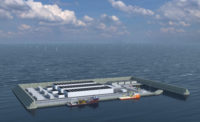The new UK Labor Party regime is creating a government-owned company to promote, develop and own clean energy projects—with an ambitious goal for a zero-carbon power system by 2030.
Set to leverage private sector investment, the new firm, called Great British Energy, also announced a new partnership with the quasi-governmental Crown Estate organization that owns seabed in England and Wales up to 12 miles offshore used for offshore wind energy development. The partnership alone will lead to between 20 and 30 GW of new offshore wind projects reaching lease stage by 2030. The UK aims to have about 55 GW of offshore wind in place nationally by then, up from 15 GW now, the government said.
Keir Starmer, Labor Party leader since 2020, became UK prime minister on July 5.
The government says it will undertake early work on projects to reduce risk for private sector partners and investors. Great British Energy "will also help boost new technologies such as carbon capture and storage, hydrogen, wave and tidal energy," said newly installed Energy Secretary Ed Miliband. He said the new entity will have $10.7 billion to deploy through 2028/29.
"Great British Energy comes from a simple idea, that the British people should own and benefit from our natural resources," said Miliband. "Investing in clean power is the route to end the UK’s energy insecurity, and Great British Energy will be essential in this mission."
Advocacy group RenewableUK said it welcomed the government’s "high level of ambition" to deliver clean energy, as well as "any measures from the Crown Estate that will cut the time it takes to build new projects."
But the group urges the government to work closely with the private sector, which it said will need to invest more than $130 billion to deliver the government’s offshore wind target by 2030.
But sector analyst Cornwall Insight cautions that achieving zero carbon power by 2030 will face "substantial challenges, particularly with funding, supply chain issues, grid connections and port capacity."
Solar and wind energy will account for 44% of national power generation by 2030, the firm says. To achieve the government goal, offshore wind capacity would have to reach 50 GW, nearly double the current projection, the analyst adds.
Questions also remain about the expansion of North Sea oil and gas production, says Bloomberg.





